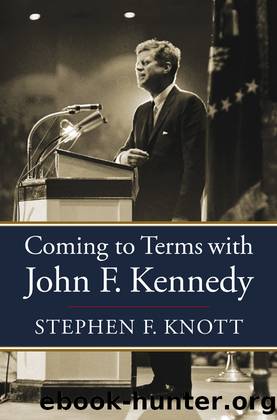Coming to Terms with John F. Kennedy by Stephen F. Knott

Author:Stephen F. Knott [Stephen F. Knott]
Language: eng
Format: epub
ISBN: 9780700633661
Publisher: University Press of Kansas
Published: 2022-08-17T00:00:00+00:00
âNo Nhus is Good Newsâ
On August 21, 1963, President Diem declared martial law, which his brother enforced with a level of alacrity seldom seen in combat operations against the Viet Cong. Several Buddhist monks were killed during these raids and hundreds were arrested. The Diem administration persisted in conducting these raids despite American protests, and even over the objections of Madame Nhuâs own father, who served as the South Vietnamese ambassador to the United States. Madame Nhuâs father resigned in protest, arguing that there was no chance to save the republic while the Diem brothers controlled his country.
Ambassador Nolting had been a consistent supporter of Diem, but his pleas for restraint were rebuffed by the South Vietnamese president, who persisted in following the advice of his brother and sister-in-law. Diem had assured Nolting that he would halt his crackdown against the Buddhists, but instead the crackdown intensified.67 The president removed Ambassador Nolting the same month the crackdown against the Buddhists began, replacing him with Kennedyâs former senatorial opponent from Massachusetts, Henry Cabot Lodge Jr., who was Richard Nixonâs running mate in 1960. The new ambassador was selected because of his known hostility to Diemâs âpolice state administration,â as he described it, and to give American policy in Vietnam a bipartisan character.68
Ambassador Lodge and other high-ranking administration officials concluded that Diem was not salvageable, that he was an authoritarian and, to make matters worse, an incompetent one at that. The key proponents of the âanybody but Diemâ coalition were Averell Harriman; Harrimanâs protégé Michael Forrestal, the son of the nationâs first secretary of defense, who served as an Asian specialist for the National Security Council; and Roger Hilsman, the assistant secretary of state for Far Eastern affairs. The latter became the driving force behind the effort to convince Diem to expel the destructive husband-and-wife team from his inner circle and, if Diem balked at this, to remove Diem as well.
On Friday, August 23, 1963, a group of South Vietnamese generals informed the US embassy that they were planning a coup against Diem. The next day, Harriman, Forrestal, and Hilsman made their move, contacting the president in Hyannisport and reaching out to other senior officials seeking approval for a message to Lodge to withdraw American support for Nhu and if necessary Diem as well. The cable stated that the American government could not tolerate a âsituation in which power lies in Nhuâs hands.â It added, âDiem must be given a chance to rid himself of Nhu and his coterie,â but if he remained âobdurate and refuses,â then âwe must face the possibility that Diem himself cannot be preserved.â Ambassador Lodge responded quickly to the cable, noting that the chances of Diem meeting the American demands were âvirtually nilâ and suggesting that his embassy team begin to âgo straight to [the] Generals with our demands, without informing Diem. Would tell them we [are] prepared [to] have Diem without Nhus but it is in effect up to them whether to keep him.â69
The president discussed this information and the broader situation in Vietnam with his national security team that Monday.
Download
This site does not store any files on its server. We only index and link to content provided by other sites. Please contact the content providers to delete copyright contents if any and email us, we'll remove relevant links or contents immediately.
The Secret History by Donna Tartt(19092)
The Social Justice Warrior Handbook by Lisa De Pasquale(12191)
Thirteen Reasons Why by Jay Asher(8912)
This Is How You Lose Her by Junot Diaz(6889)
Weapons of Math Destruction by Cathy O'Neil(6281)
Zero to One by Peter Thiel(5802)
Beartown by Fredrik Backman(5759)
The Myth of the Strong Leader by Archie Brown(5509)
The Fire Next Time by James Baldwin(5449)
How Democracies Die by Steven Levitsky & Daniel Ziblatt(5219)
Promise Me, Dad by Joe Biden(5154)
Stone's Rules by Roger Stone(5088)
A Higher Loyalty: Truth, Lies, and Leadership by James Comey(4964)
100 Deadly Skills by Clint Emerson(4927)
Rise and Kill First by Ronen Bergman(4790)
Secrecy World by Jake Bernstein(4753)
The David Icke Guide to the Global Conspiracy (and how to end it) by David Icke(4720)
The Farm by Tom Rob Smith(4514)
The Doomsday Machine by Daniel Ellsberg(4490)
